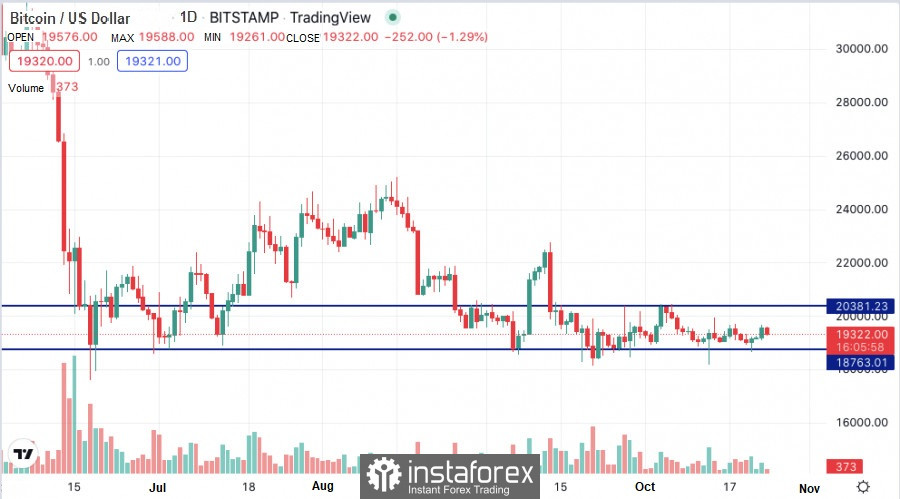Bitcoin, despite restrained volatility, is stubbornly holding above its July lows. The support of 18,763 held this time as well, and on Sunday the price continued its recovery.
So far, nothing fundamentally changes on the chart, but something is happening behind the scenes of the market, more and more analysts are expressing bold thoughts about the proximity of a new rally in the cryptocurrency market.

Bitcoin fish are actively accumulating cryptocurrency
Network data shows that while the main cryptocurrency is hovering in the $18,000–$20,000 range, there is some divergence within the network between Bitcoin whales and Bitcoin fish.
Whales are market participants who own more than 1,000 BTC, while fish are those who own relatively small amounts of BTC.
So Bitcoin fish accumulated BTC while the main cryptocurrency is trading sideways. For example, according to data provided by Glassnode, the net supply of bitcoins held at addresses with a balance of 100–1,000 BTC increased from 3.71 million in June to 3.77 million in October. The supply of bitcoins belongs to organizations with a balance of 100–1,000 BTC.
Similarly, the supply of bitcoins held at addresses with a balance of 10–100 BTC also rose from 3 million to 3.15 million over the same period. The trend is the same for organizations holding anything between 0.001 and 10 BTC.
Meanwhile, the same period of sideways price action coincided with a decline in BTC supply held by whales. For example, the supply of bitcoins held by the 1,000 to 10,000 BTC cohort has fallen from 3.82 million to 3.69 million since June. In addition, the 10,000–100,000 BTC group has reduced its holdings in the main cryptocurrency from 1.98 million to 1.92 million over the same time period.
Share of influence of Bitcoin whales on the market
The main interpretation of the data mentioned above is that fishes are more confident than whales about the potential bottom of the Bitcoin price around $18,000.
But while these smaller investors may have been absorbing the massive selling pressure generated by larger investors, the risk of loss has historically been higher as whale populations decline.
Interestingly, when Bitcoin reached its all-time high price of $69,000, the number of whales remained relatively unchanged at the time. This may indicate that whales are having less of an impact on the market compared to previous years, especially as exchange balances continue to hit multi-year lows.
Correlation of Bitcoin with gold is rising
Fishes continue to hoard tokens amid reports that investors are once again considering Bitcoin as a safe-haven asset.
For example, Alkesh Shah and Andrew Moss, digital strategists at Bank of America, have cited the weakening correlation of the major cryptocurrency with US stock indices and increased compliance with gold price movements as a sign that the cryptocurrency is looking to live up to its "digital gold" narrative in the future.
Notably, Bitcoin's 40-day correlation with riskier markets such as the Nasdaq Composite and S&P 500 has stabilized around 0.69 and 0.75 respectively, below their all-time highs a month ago. On the other hand, its correlation with gold rose from zero in August to 0.67 in October.
"A decelerating positive correlation with SPX/QQQ and a rapidly rising correlation with XAU indicate that investors may view Bitcoin as a relative safe haven as macro uncertainty continues and a market bottom remains to be seen," Bank of America wrote.
Others, however, expect the price of the main cryptocurrency to eventually fall below the $18,000 support level. The view that the price of BTC could fall to $10,000, given the close correlation with risky assets and macroeconomic headwinds, is also heard in the market.
Crypto Quant: Bitcoin is actively accumulating despite uncertainty
Meanwhile, Ki Young Ju, head of analytics firm Crypto Quant, notes that two major stakeholders are actively accumulating BTC at current levels despite uncertain market conditions.
Ki Young Ju highlights that large investors, whales, are aggressively uploading BTC through the leading digital asset exchange Binance.
Since the price of the main cryptocurrency reached the $20,000 level, Binance's dominance in terms of spot trading volume has increased dramatically, and now stands at 84%. The second highest was the accumulation on Coinbase, at 9%.
Ki Young Ju also highlights that Bitcoin spot trading volume has skyrocketed across all exchanges over the past six months, indicating enough demand to absorb intense selling pressure.
"BTC spot trading volume for all exchanges increased 20x over the past six months. The volume renewed a year-high last month, but not much change in the daily closed price, indicating someone is buying all the sell-side liquidity."
The CEO of Crypto Quant also notes that the whales have taken over the BTC futures markets.
"BTC futures traders are now mostly whales. The average amount of Bitcoin deposits to derivative exchanges from other exchanges is relatively big, a five-year high."
There is an opinion that Bitcoin tends to bottom out when whales dominate the futures markets.
Also, Ki Young Ju believes that BTC miners are "extremely optimistic right now" about the main cryptocurrency.
"Hashrate to mining revenue ratio hit an all-time high, meaning they keep investing in infrastructure despite very small BTC mining revenue. Historically, miners were underwater in the short term but never failed in the long term."
 English
English 
 Русский
Русский Bahasa Indonesia
Bahasa Indonesia Bahasa Malay
Bahasa Malay ไทย
ไทย Español
Español Deutsch
Deutsch Български
Български Français
Français Tiếng Việt
Tiếng Việt 中文
中文 বাংলা
বাংলা हिन्दी
हिन्दी Čeština
Čeština Українська
Українська Română
Română

